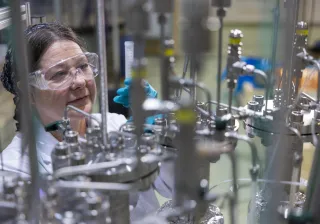Animal skin is an excellent material, but the tanning process of leather causes significant chromium emissions that are damaging to the environment and human health. Synthetic leathers also burden the environment and fail to match the quality and durability of animal leather. Therefore, new bio-based replacement materials are sought for leather. VTT is using fungal mycelium to produce skinlike material that would be suited for industrial production.
For centuries, fungi and polypores have been used for making skinlike fabrics and accessories in Europe. Designers and researchers are now reviving this tradition to find sustainable alternatives to replace leather.
VTT has been studying fungi and other microbes and their use in industrial biotechnology for quite a while. In laboratory conditions, fungal mycelium can be used to rapidly produce skinlike material with quite similar feel and tensile strength as animal skin,
Some items made of fungus-based leather are already being produced for commercial markets. However, the bottleneck lies in industrial-scale production.
We have focused on scalable bioproduction methods and the use of industrial processes in the production of our material. The results have been promising,
Organic waste used as raw material, new properties created with biotechnology
The production process of fungus-based leather represents circular economy at its best: organic waste can be used as raw material for synthetic leather. Fungal mycelium can produce skinlike material out of, for example, food waste.
VTT will continue to develop the properties of fungus-based leather.
Next, we want to add new properties to the material and improve, for example, its wear resistance with the help of biotechnology. We have already made materials out of fungal mycelium that produce new kind of biopolymers within the material,
iBEX programme solves global challenges
The new material has been developed as part of VTT's iBEX 2019 programme. The programme is an example of a new way of making applied research more solution-oriented, and it currently includes 11 research projects. The projects tackle some of the great global challenges and seek radical solutions to them in collaboration with the industry and the surrounding society. The iBEX programme is a runway for innovations that will change the world. In November 2019, Plant Breath, a research project developed under the iBEX program, won the EUR 100,000 prize in the final of the Slush and Skolar Research Ideas Pitch Contest.




